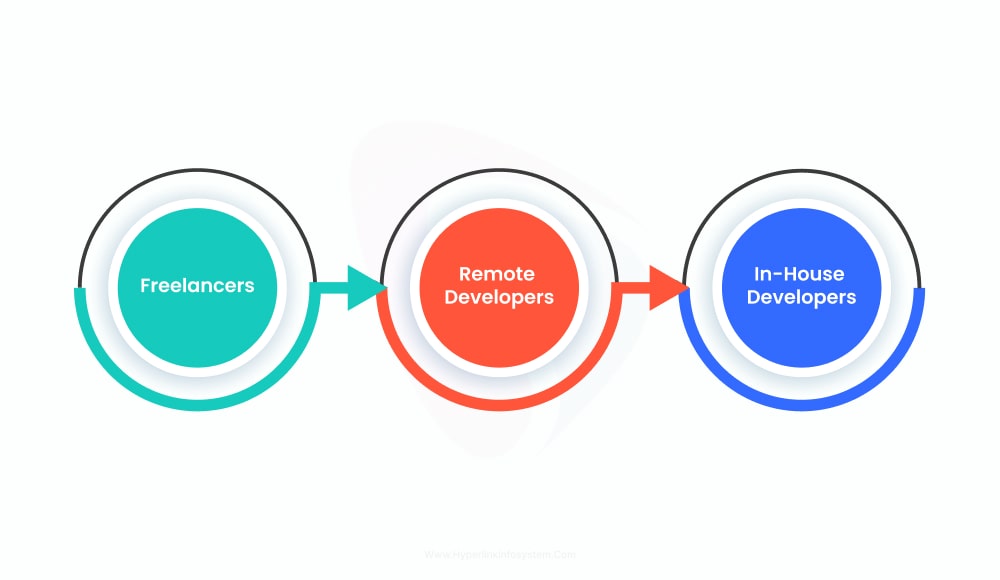
When it comes to software development, businesses often get confused when deciding how to build and manage their development team. Rapid digital transformation creates a high demand for quality developers, but finding the right talent for the project is not easy. While remote developers allow access to the global workforce, freelancers offer flexibility at lower prices. In-house developers provide consistency, better understanding, and good collaboration within the team.
Let's think of a scenario: A company that has very little time left to market its product could find freelancers useful. On the other hand, as a growing business, it can hire an offshore development team at a cost-effective price yet with skilled personnel. Meanwhile, an established corporation that believes in growth and easy integration, may decide to bring on board in-house developers to ensure constant reinforcements of the development cycle that is in line with the product strategy. Each option has its advantages and disadvantages, which complicate the choice all the more.
This article will examine in detail the cost comparison of in-house developers, remote developers, and freelance ones, considering ‘non-obvious’ costs, benefits in the long run, and productivity effects besides the cash differences. By analyzing hourly rates, quality of work produced, management costs, and the overall results achieved, one can obtain a clear picture of what decision is the most favorable for a certain organization.
Understanding Freelancer Developers
Freelancers have become a common feature in almost every contemporary workforce in the tech industry. These freelance professionals also possess certain skills that they offer either on an hourly basis or on a project basis to help businesses augment their teams as per demands. Nevertheless, there are important factors to consider before going for this option, even if it would seem logical to pursue the services of freelancers for initial costs.
The operability of freelancers is one of the primary aspects that are leveraged by companies. Small businesses or enterprises at the growth stage and on limited funds may prefer to hire freelancers. According to a report by Upwork, freelancers usually charge their pay rates ranging from $25 to $150 an hour, based on expertise, which is perfect for mini jobs. However, this convenience has its costs.
Short-term, focused tasks are ideally suited for freelancers since they often have specific skills for such tasks. Suppose you need an expert in ORM tools like Python or a front-end framework like React; then a freelancer would fit in perfectly. Like if you want to go for android app development then you can directly hire android app developers same with iOS app development, you can hire iOS developers. However, since there are different levels of abilities, selecting the right one requires a detailed vetting process. While a large number of them are quite skilled, some may still be in training.
Freelancers who offer their services to clients just for the project, are used affordable and flexible, yet tend to have a few clients at a time. Since they split their focus between a couple of projects, this means a slower turnaround period, especially when they are not accessible in high-contact stages of the process; a risk of that stage delaying the entire project is likely.
Understanding Remote Developers
Recently, the number of remote developers has increased considerably due to the advancement in collaborative tools and communication technologies. Unlike freelancers, remote developers are generally employed by a company either on a full-time basis or as external members of a team but do so from places away from the usual office. With this strategy, employers can tap into a reservoir of talent without concern for geographical limitations, which may be something that freelancers might not provide within their level of commitment and consistency.
One of the foremost advantages that hiring remote engineers brings to the table is the ability to procure the best talents without minding the geographical location. Geographical boundaries do not apply in this case. A New Yorker, for example, can hire less expensive skilled labor from regions like Eastern Europe or India without losing any of the expertise. This willingness to hire labor from across the globe is likely to cut costs too. According to a report by Global Workplace Analytics, businesses converting to remote working practices facilitate a reduction in the cost of operating—on average, about $11,000 a year for every employee.
Unlike freelancers, remote developers are typically full-time employees of the company, either directly or through the intermediary of a contracting company. This full-time engagement comes in handy for long-term projects as it offers stability and reliability. Remote engineers tend to fit into the company’s procedures and culture, as they work with internal teams, have regular meetings, and adhere to set work hours. This dedication also allows for a smoother progression of projects, enhanced collaboration, and the ability to handle more complex and long-term assignments, which is quite different from the business-oriented relationship of freelancing.
The evolution of cloud-based applications such as GitHub, Jira, Zoom, Slack, etc. has greatly enhanced remote work. These solutions promote shared teamwork since remote developers can share codes, communicate in real-time, as well as attend virtual meetings. However, managing remote software engineers remains a challenge for app development companies. Time differences can at times interfere with communication, and it may be worse trying to bring people together as a team than if they were all internal staff’. For successful operation and prevention of miscommunication, certain mechanisms must be put in place.
Remote developers often tend to be more productive owing to the fact they have fewer distractions in the office as well as a more flexible work-life balance. Research by Owl Labs shows that employee productivity of 35% to 40% is greater for those who work remotely as opposed to those who work from an office. Plus, dedicated developers for hire often report higher levels of satisfaction in doing their jobs, which in turn may lead to higher retention rates. However, to ensure efficiency in remote work, the presence of clear performance indicators and regular check-ins is essential to the functionality of remote teams.
Even though hiring remote engineers reduces overheads on electricity, office space, and the like, there are still other considerations to bear in mind. App development companies allow employees to work remotely, it might be imperative to invest in the right infrastructure and technologies. Also, managing teams that work remotely requires more focus and time, that is, spent on communication and collaboration, as well as ensuring information security compliance is observed. For a business to reach a fair conclusion on whether remote development is appropriate, costs such as these have to be balanced against the benefits.
Understanding In-house Developers
Full-time employees at a corporate office tend to be in-house developers, which enables a high level of integration with the organization’s culture and ambitions. Such closeness allows communication and teamwork to take place at a faster rate and problems to be dealt with in real-time, enabling rapid scaling up of the projects. In-house teams are often more committed to ensuring that the results produced help to further the organization’s strategic objectives.
When in the workplace, in-house developers usually perform their roles with different divisions, resolving issues on the spot and working together well. Their constant presence removes any distractions that distract the focus from completing the projects in a business and therefore enables them to finish the projects quicker and take on more responsibility. In comparison to freelancers or remote developers, they hold higher accountability.
Since in–house developers work solely for the organization, they have a better comprehension of its processes and are more likely to remain with the organization for a longer period. That enables them to provide consistency and innovativeness that may not be possible with other project teams since they can be trained and molded as per the organization’s needs.
Maintaining in-house developers as a policy comes at a cost, but benefits in the long run do outweigh that cost. Basic costs such as salary, benefits, space, and tools result in the amplification of overheads. Excluding such external costs that may include the replacement of staff or revising job descriptions, for instance, a software engineer’s average salary per year in the US stands at approximately $110,000 as reported by Glassdoor.
In-house software developers come in at high prices but over time provide a good return on investment (ROI). Their loyalty and understanding of the organization’s systems help them to think outside the box which is critical for companies that are looking for growth and continuity making them very important assets.
Direct Cost Comparison
| Criteria | Freelancers | Remote Developers | In-house Developers |
|---|---|---|---|
| Hourly Rate | $25 - $150/hour (varies by skill and location) | $40 - $100/hour (depending on region) | N/A (Full-time salary-based) |
| Annual Package | Project-based, varies | $40,000 - $80,000/year | $70,000 - $130,000/year |
| Hiring Costs | Low (freelance platforms or direct outreach) | Moderate (recruitment fees, onboarding time) | High (recruitment agencies, training, onboarding) |
| Perks and Benefits | None | Usually None (unless hired via agencies) | Health insurance, paid leave, bonuses, perks |
| Infrastructure Costs | None | Communication tools, Software Licenses | Office space, equipment, software, utilities |
| Management Overhead | High (project-based coordination) | Medium (requires structured management & tools) | Medium (easier with in-house oversight) |
| Commitment | Low | Moderate (longer-term but remote) | High (long-term, fully integrated team) |
| Working Time | Part-time/Project-based | Full-time (but remote)) | Full-time |
| Turn-around Time | Varies, may face delays | Steady, but depends on the time zone | Fast due to real-time collaboration |
| Productivity | Varies (depends on multiple projects) | High (full-time focus, with possible time zone lags) | Very High (dedicated to company, real-time work) |
| Long-term Costs | Low (short-term savings) | Medium (ongoing management) | High (salaries, benefits, infrastructure) |
Cost Efficiency vs. Quality
Freelancers are suitable for particular jobs, especially with flexible rates and short-lived projects; however, they lack the aspect of long-range quality control. In-house developers are expensive to employ but ensure great quality and consistency considering how close they are to the business. However, dedicated developers for hire present a middle ground where the two extremes are dedication and price.
Flexibility vs. Stability
The greatest adaptability is provided by freelancers who allow organizations to easily increase or decrease in size concerning the requirements of a certain project with no long-term obligations. On the other hand, internal programmers deliver reliability and a long-term devoted workforce that is well-fit within the organization’s culture and objectives, while distant programmers are free yet available more regularly.
Management and Collaboration
Coordinating and supervising freelancers requires more effort which can lead to issues of communication and flow of work. In-house developers benefit from clear lines of communication and the ability to work together at the same time, which leads to effective working relationships, whereas, at the very least, remote associates are better managed as compared to freelancers, but this approach calls for strict adherence to discipline for mobile app development companies.
Benefits

Here are the benefits of Freelancers, Remote Developers, and In-House Developers, businesses can hire accordingly as per their needs:
1. Freelancers
Flexible Costing: Unlike in-house developers, freelancers can work on and get paid for as many projects over a certain period. This is effective for short-term employment whereby there is no financial obligation for a long-term contract.
On-demand Hiring: Businesses can use other platforms like Upwork or Fiverr to hire freelancers without the need to go through lengthy recruitment processes as per their requirements.
No Other Costing: There are no additional costs of running a business as each freelancer comes with their own equipment negating the need to spend money on providing office space, facilities, or even employee benefits.
2. Remote Developers
Minimized Overhead than In-House: Remote developers help save costs on office structure, resources, and facilities since they provide specialized full-time services but not on-site.
Access to Global Talent Pool: By permitting an element of credence to remote working, the companies can hire app developers from other regions that often have cheaper rates than in-house employment like Indian app developers would charge less than European developers.
Team Scaling Flexibility: Since there are no physical inhibitions associated with office space, remote developers can scale teams according to the project needs.
3. In-House Developers
Teamwork and Collaboration: Internal development teams tend to collaborate better with members of other departments as well as communicate face-to-face in real-time and this increases productivity.
Employee Commitment: They are furthermore employees who dedicate themselves to the company for longer periods and have experience with their systems, culture, and objectives.
Better Management: Organizations have the power of direct managerial control over internal teams and this allows for better workmanship through monitoring and ensures that there is proper adherence to project goals.
Such advantages which offer most companies variations in cost, and availability of resources including human capital as per their specifics, present arguments in favor of the necessity of each model.
Why Hiring Remote Developers or a Remote Mobile App Development Company is the Best Choice?
As it tends to be less expensive, a lot of organizations are now concluding that hiring remote developers or a remote mobile application development company is the best choice. While in-house development teams incur such expenses as utilities, office space and equipment, and even employee benefits, remote development teams do not have these costs. This monetary saving for recruitment might be beneficial for small medium enterprises (SMEs) or startups that are hopeful to advance their prices. Additionally, hiring in regions with low cost of living enables organizations to hire dedicated developers at a lower rate and this makes business sense. Let's say if a business wants to launch an application but has a mid-range budget then they can hire app developers in India at lower rates compared to regions like UK, USA, and Canada.
Hiring on a remote basis is beneficial in many ways, one of them being economic factors and another major being the ability to hire dedicated developers far and wide. Businesses don't have to rely on local talent, much more so in situations where such local talent is hard to come by.
Companies will be able to source for the developers who best suit the particular project, hence increasing the chances of better and more inventive mobile application development.
In conclusion, hiring offshore mobile app development company for the technical aspects of the app production process allows businesses to devote more time and effort toward their primary areas of advantage. Remote companies often have standard project management systems and experienced task teams, making it easy to assign tasks and communicate with managers. Such an approach allows for the internal capacity of the company to be devoted towards more productive measures like growth strategies, client management, etc. by having third parties implement and manage the app development process. For more information on hiring a developer to develop apps for your company, contact our team today.
Hiring developers remotely allows companies to achieve the best equilibrium in outsourcing: flexibility, cost, and worldwide skilled labor, especially from agencies like Hyperlink InfoSystem. Hire app developers in India allows businesses to access the very best in the land, obtain skilled services at competitive rates, and ensure timely completion of project services without compromising on quality. At Hyperlink InfoSystem, whether you wish to develop an application, implement cutting-edge technology, or hire additional personnel for a different project, We have the skills and experience to ensure that your business thrives. If you want to take your app development to the next level, hire India's top talent us and enjoy the benefits of remote development.
FAQs
Q- Is it cheaper to hire freelancers?
Ans. Yes, hiring freelancers isn’t expensive because they do not require benefits and do not make long-term commitments so it’s always cheaper for short or medium-term assignments. Nevertheless, they may vary prices depending on the project’s size and their expertise.
Q- What is the difference between in-house and remote developers?
Ans. Working on-site at companies, in-house developers provide deeper team integration and real-time collaboration. Although they offer flexibility, cost advantages, and access to worldwide talent, remote developers operate from various places and necessitate more structured communication.
Q- Which is better, in-house or outsourcing?
Ans. Outsourcing is often more advantageous for project management in issues related to cutting costs, availing specialized global expertise, and flexible scaling of projects. In this case, professional teams handle the entire development process, while you focus on other business procedures. This leads to a shorter product development cycle and lower organizational costs.
Q- What is the disadvantage of freelancers?
Ans. Most of the freelancers handle many projects and clients at once, so you can not expect them to be fully committed to your project. Also, the lack of attention can lead to missing out on details on the project.
Q- What are the benefits of hiring remote developers?
Ans. Businesses can access a global talent pool by hiring remote developers. In addition to that, businesses can save on the cost of office structure and arrangement.



















